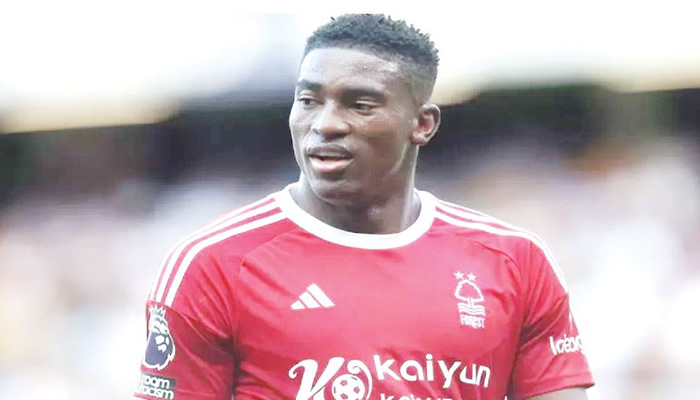The football world held its breath as Nottingham Forest striker Taiwo Awoniyi battled for his life after suffering a severe abdominal injury during a match against Leicester City. The incident, which initially appeared to be a routine collision with the goalpost, escalated into a life-threatening situation requiring emergency surgery and an induced coma. While Awoniyi has thankfully recovered and emerged from the coma, the circumstances surrounding his injury have ignited a fierce debate about the delayed offside rule implemented in 2020. This rule, designed to prevent premature stoppage of play and allow potentially advantageous attacking moves to develop fully before assessing offside, has come under scrutiny as some argue it played a direct role in Awoniyi’s near-fatal injury.
At the heart of the controversy is the sequence of events leading up to the collision. Nottingham Forest player Anthony Elanga was clearly in an offside position as the team launched an attack. Following the delayed offside rule, the assistant referee, Massey-Ellis, kept her flag down, allowing play to continue. This decision adheres to the International Football Association Board (IFAB) directive, which stipulates that the flag should remain down in clear attacking situations where a goal-scoring opportunity or a clear run towards the penalty area is imminent. In this instance, the play continued, culminating in Awoniyi’s unfortunate collision with the goalpost as he chased the ball.
The severity of Awoniyi’s injury – a ruptured intestine – shocked the football community. He underwent an initial medical procedure on Monday, followed by an induced coma on Tuesday and a second operation on Wednesday. The gravity of the situation underscored the potential risks associated with high-speed collisions in football, particularly when players are unwittingly exposed to danger due to delayed offside calls. The incident sparked an immediate outcry, with many questioning the wisdom of prioritizing the flow of play over player safety.
Ola Aina, Awoniyi’s teammate at both club and international level, expressed his concern and frustration over the incident. He confirmed reaching out to Awoniyi with messages of support and relief upon hearing of his recovery. Aina, however, did not shy away from criticizing the delayed offside rule, which he believes directly contributed to Awoniyi’s injury. He argued that the flag should have been raised immediately upon Elanga’s offside position being evident, thus preventing the subsequent chain of events that led to the collision. Aina’s perspective reflects a growing sentiment within the football community that the current implementation of the delayed offside rule may be jeopardizing player safety.
The crux of the argument against the delayed offside rule, as highlighted by Aina’s statement, is that it creates unnecessary risk by forcing players to continue playing at full speed even when an offside has occurred. In this scenario, Awoniyi, driven by his competitive instinct, continued to pursue the ball, unaware that the play would be eventually deemed invalid. This relentless pursuit, encouraged by the delayed flag, placed him in a vulnerable position where a collision with the goalpost resulted in a life-threatening injury. Critics argue that had the flag been raised immediately, Awoniyi would have likely slowed down or stopped altogether, avoiding the collision and its devastating consequences.
The debate surrounding the delayed offside rule brings into sharp focus the difficult balance between preserving the flow and excitement of the game and ensuring the safety of the players. While the rule aims to reduce interruptions and allow potentially exciting attacking moves to develop, the Awoniyi incident highlights the potential for serious injury when players are compelled to continue playing under circumstances where the play may ultimately be deemed invalid. This incident has reignited the discussion on whether the benefits of the delayed offside rule outweigh the risks it poses to players. The footballing authorities face a challenging task in reviewing the rule and finding a solution that safeguards both the spirit of the game and the well-being of the players. The incident serves as a stark reminder that player safety should always be the paramount concern in any sport.


